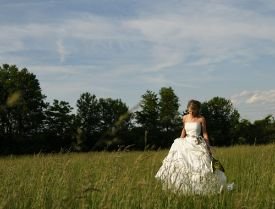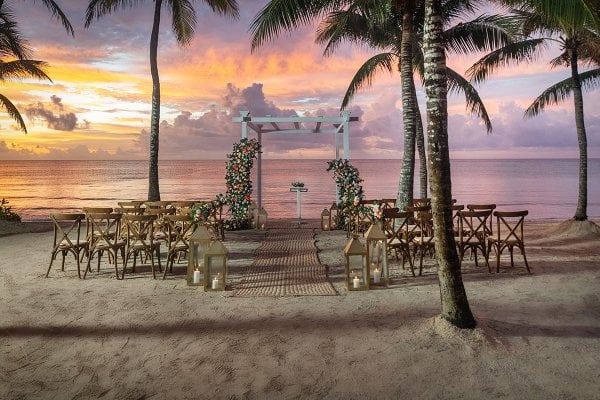Don't let watery eyes and a runny nose ruin your wedding day. Here are some expert tips to help you deal with your seasonal allergies.
By: Jennifer LazarusFor seasonal allergy sufferers, this is one of the toughest times of the year. If you’re planning a wedding outdoors, well- known New York City allergist Dr. Sam Grubman can help make the outdoor wedding experience more comfortable for you and your guests so you can have a sniffle-free, clear-eyed wedding day.
|
|
Q: What is typically the worst time during the year for seasonal allergies?
A: The worst time for seasonal allergy sufferers is when the trees bloom in early-to-mid spring, when the grasses pollinate in mid-to-late spring and when ragweed (and other weeds) appear in the late summer and early fall.
Additionally, as unpleasant as it may sound, harmless mold spores are in the air throughout the growing season and people can be allergic to them as well. In parts of the southern United States, they are present throughout the year and are more of a perennial, rather than a seasonal, problem. In the northern parts of the United States, mold spores are present from spring through fall and for many, contribute to seasonal allergy problems. Since outdoor weddings generally happen during the warmer months people who are allergic to molds will be affected.
|
Top 5 Tips for Having an Outdoor Wedding During Allergy Season 1. Timing is everything. Find out exactly what pollens you are allergic to and choose a date that avoids peak counts for those pollens in your area. Also, pollen counts are usually highest in the morning, so plan accordingly. 2. Visit your allergist well in advance of the wedding day and start an appropriate medication regimen to keep you free of symptoms and unwanted side effects. 3. People with seasonal allergies are usually more sensitive to strong odors during the pollen season. Choose flowers that are light in the fragrance department. 4. Consider a seaside wedding. Offshore winds have less seasonal pollen and pollen travels less in moist air so people with allergies generally fare better near the ocean. 5. For lawn weddings, ask that the grass be cut prior to the day of the wedding as freshly cut grass can be problematic for grass allergic individuals, even outside of the grass pollen season. |
Q: Roughly how many people in this country suffer from seasonal allergies?
A: It is estimated that about 20% of Americans suffer from allergies, both seasonal and perennial. The incidence has been increasing since the early 1980s across all age, sex and racial groups.
Q: Are there certain areas of the country that are worse for seasonal allergy sufferers?
A: Seasonal allergies can cause severe problems throughout the United States. Some portions of the country have shorter pollen seasons than others, but the degree of symptoms can be as bad, if not worse, in areas with short seasons and very high peak pollen counts. Although there are fewer trees, grass and weeds in urban areas, air pollution in those areas can accentuate symptoms in allergic individuals. In general the seasons are longer in the South and Midwest. The Asthma and Allergy Foundation of America rates cities each year for spring allergies and the highest on the list are usually cities from the South and Midwest. You can find out what the pollen count in your area is on any given day by visiting pollen.com.
For pollen allergy sufferers who would like an outdoor wedding, one location to consider is the beach because there is usually less pollen in the air due to the off shore breezes. Those with grass pollen allergy who are having an outdoor wedding on a lawn should consider asking that the grass be cut prior to the day of the wedding as allergens are released into the air from freshly cut grass.
Q: Is there anything a seasonal allergy sufferer can do to build up immunity in preparation for allergy season?
A: There are many effective medications on the market, both over the counter and prescription, which can control allergy symptoms for most patients without unwanted side effects like fatigue. Most people with mild seasonal allergies can control their symptoms with non-sedating over-the-counter antihistamines. Patients with moderate or severe seasonal allergies often need to be on a combination of up to five different medications to control their symptoms. This combination could include oral medications, nasal sprays and eye drops. Although we generally think of eye and nose symptoms when discussing seasonal allergies, some people will develop seasonal asthma as a result of pollen sensitivity and additional asthma medications will need to be used for these patients.
Allergy medications work best when they are taken daily on a regular basis throughout the pollen season. Through accurate allergy testing, it can be determined when the medication should be taken in a given geographic region. If you wait for symptoms to take medications, you will be behind the eight ball and relief will be more difficult to achieve.
Allergies result when your body mounts an allergic immune response against otherwise harmless substances such as pollen. Allergies do not reflect a weakened immune system, but reflect an immune system that is overactive in a very specific way. The medications mentioned above all act by controlling symptoms and do not fix the problem. The only way to change the body’s underlying immune response away from an allergic response is with allergy shots. This is a long term therapy that needs to be started 6–12 months prior to the allergy season in order to be effective. People with moderate or severe disease should consider allergy shots, especially if they have severe symptoms for more than a few weeks.
Q: What if a bride and groom choose to have an outdoor wedding during peak allergy season—is there anything they can do to prevent puffy eyes and a watery nose in their wedding pictures?
A: Outdoor weddings are very special circumstances—and there are measures you can take beyond over-the-counter and traditionally prescribed allergy medications to control your seasonal allergies for the period around your outdoor wedding. I have successfully ushered even the most severely allergic brides and grooms down the aisle without runny noses and watery eyes—and saved them from outdoor wedding pictures that needed touch ups.
Everyone wants to look and feel their best on their wedding day, and there is no reason people with allergies can’t achieve that goal. For the vast majority of patients a combination of either over the counter or prescribed allergy medications will do the trick. But, sometimes I am faced with a bride or groom who has planned a wedding at the peak of allergy season and their allergies cannot be controlled with these medications. For these people, I will consider a short course of oral steroids. Steroids are very strong anti inflammatory medications that work well in controlling the allergic immune response. The reason they are not routinely used for seasonal allergies is because of the potential side effects when they are used for more than very short term therapy. I usually start a bride or groom on oral steroids 1–2 days prior to their wedding and through their wedding day if they are suffering from serious seasonal allergies. The other standard allergy medications should be continued along with the oral steroids. Luckily, I have yet to have a patient whose allergy symptoms could not be controlled using this approach.



